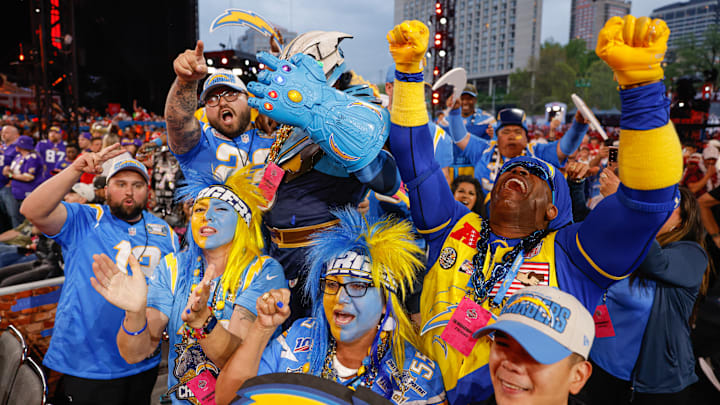Not everyone is going to love every move that the LA Chargers made this offseason. That is part of the business: every decision that the team makes is going to be picked apart by fans and analysts alike.
However, some negative criticism of the Bolts does not make much sense when you really dive into the criticism itself. That is the case with CBS Sports' Cody Benjamin's negative grade handed out to the Chargers this offseason.
Benjamin gave the Chargers a D- grade for their efforts this offseason. Ouch. In his grade, Benjamin concluded the following:
"A mega extension for QB Justin Herbert might salvage an otherwise ho-hum offseason, which was destined following their spending spree in 2022. LB Eric Kendricks might be primed for a rebound behind their talented front, but he's not exactly a difference-maker at 31, either. Their first-round investment, WR Quentin Johnston, could be special, but he also feels a bit redundant with Mike Williams' skill set in their attack. Maybe he'll prove us all wrong."
Why giving the Chargers a D- grade this offseason is ludicrous:
I tend to agree that a mega-deal for QB1 would be an outstanding addition to our offseason. However, I do not subscribe to the idea that it would “salvage an otherwise ho-hum offseason.”
Also, unrelated, but I would like to state for the record that I completely detest the usage of “ho-hum” as a descriptor for ANY offseason. What a trojan horse of a word - on the surface, it seems show-tuney and bright - but in reality it means boring. Irrespective of that, let's dive into Mr. Benjamin’s take.
To begin, defining Eric Kendricks as a player in need of a “rebound” seems to be amnestic of the previous 8 seasons where he averaged roughly 107 tackles per season. Considering Kendricks’ usage, availability, and run-stop rate, it seems that a “rebound” is not exactly an accurate depiction of Kendricks’ ability.
Also, when considering the team-friendly 2-year deal that was employed to sign Kendricks (which really operates as a one-year rental with an option to move on in year two), it seems obvious that the value of this signing alone would transcend a D-grading. Lest we forget Kendricks’ leadership, experience, and locker room presence on a relatively young team.
Next, Mr. Benjamin then leapt forward to the drafting of Quentin Johnston (in complete disregard of the transactions that transpired between the Kendricks signing and draft night). In my opinion, this is an unfair oversight that certainly contributed to his D-grading.
Isn’t the offseason the sum of every move a team can legally make? External free agents, internal moves, trades, draft night, undrafted free agents, and so on...
If so, then what of the Trey Pipkins signing? Was that ho-hum? A 26-year-old cerebral, homegrown right tackle standing at 6’6, 310 lbs, who will play hurt and anchor the right side of the line for the next 3 seasons? A team guy who the Chargers were able to lock up well under his free market value? That doesn’t transcend a D-grading?
Okay. What about the re-signing of Donald Parham? A 25-year-old, 6’8 red-zone nightmare that the Chargers brought back for pennies on the dollar. Taking a flier on a young playmaker with a ton of red-zone upside doesn’t transcend a D-grading?
What about the restructures of Keenan Allen, Mike Williams, Joey Bosa, and Khalil Mack? Those moves allowed the Chargers to be flexible externally, internally, and spend a little more on their undrafted free-agent haul. Not to mention the flexibility it provides for QB1’s future mega-deal. That doesn’t inch the Chargers closer to a C-grading, at least?
Got it. What about the denial of Kenneth Murray’s fifth-year option? This move clears the runway for a future two-linebacker rotation that could include Kendricks and recently drafted Daiyan Henley (an uber-talented freakish athlete from Washington State). This duo, most importantly, will not break the salary-cap bank.
Lastly, what about the draft? Mr. Benjamin described the drafting of Quentin Johnston as potentially “redundant”. If you were considering this draft class in a vacuum, then sure.
However, based on offseason restructures and future salary-cap implications, it is unlikely that the Chargers will keep Mike Williams and Keenan Allen beyond the 2023 season. It is likely that it’ll be either or. Doesn’t the drafting of Johnston become more of a necessity than a redundancy? Shouldn't that push the Chargers above a D-grading?
Benjamin has woefully overlooked the totality of the Chargers' offseason moves. To say that the Chargers signed an aging backer in need of a “rebound” is unfair. To reduce the Chargers' draft overhaul to an exercise in redundancy is short-sighted. Only time will tell what happens with this roster - but I believe the Chargers possess everything they need to compete at the highest level.
MUST-READ: Predicting the outcome of every Chargers game in 2023
